人教版六年级英语下册一般现在时态练习题
(人教pep)六年级英语下册时态练习_0
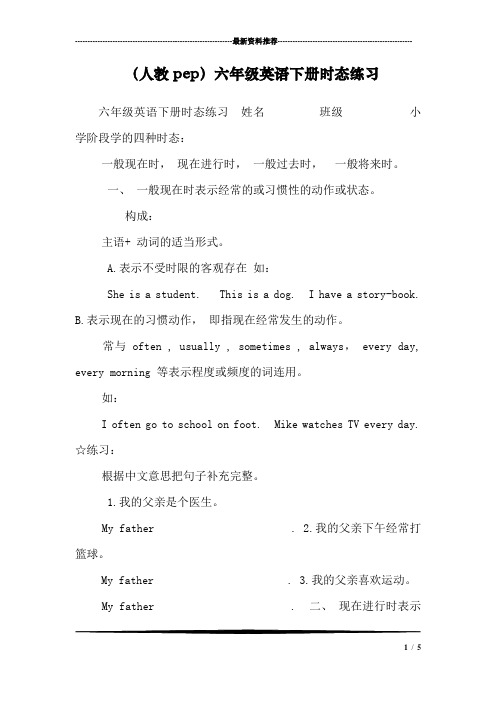
---------------------------------------------------------------最新资料推荐------------------------------------------------------ (人教pep)六年级英语下册时态练习六年级英语下册时态练习姓名班级小学阶段学的四种时态:一般现在时,现在进行时,一般过去时,一般将来时。
一、一般现在时表示经常的或习惯性的动作或状态。
构成:主语+ 动词的适当形式。
A.表示不受时限的客观存在如:She is a student. This is a dog. I have a story-book.B.表示现在的习惯动作,即指现在经常发生的动作。
常与 often , usually , sometimes , always, every day, every morning 等表示程度或频度的词连用。
如:I often go to school on foot. Mike watches TV every day. ☆练习:根据中文意思把句子补充完整。
1.我的父亲是个医生。
My father . 2.我的父亲下午经常打篮球。
My father . 3.我的父亲喜欢运动。
My father . 二、现在进行时表示1 / 5正在进行或发生的动作。
构成:主语+ be+动词的 ing 如:I am writing a letter. Amy is swimming. They are reading books. ☆练习:根据中文意思把句子补充完整。
1.我正在做作业。
I . 2.John 正在看电视。
John . 3.Amy和Sarah正在下棋。
Amy and Sarah . 三、一般过去时表示在过去某个时间发生的动作或存在的状态,也可表示过去经常或反复发生的动作。
常与 yesterday, yesterday afternoon, last year等表示过去的时间连用。
(完整版)六年级英语时态专项练习题

小学六年级英语时态练习题(一般现在时、现在进行时、一般将来时、一般过去时)Ⅰ用适当形式填空.1. He __________ back a month ago. (come)2. My mother often tells me __________ in bed. (not read)3. I must take it back the day after tomorrow. You can only __________ it for 24 hours. (keep)4. Why have you kept me __________ here for so long a time? (wait)5. Please come to our meeting if you __________ free tomorrow. (be)6. She __________ to the Great Wall several times. (go)7. In his letter, he said that he __________ us very much. (miss)8. The film __________ for nearly fifteen minutes when I got to the cinema. (be)9. He said he became __________ in physics. (interest)10. This film is worth __________. (see)11. He went to school instead of __________ home. (go)12. In the old days it was difficult for the poor to __________ a job. ( find)13. It's cold outside, so you'd better __________ your coat. (put on)14. He is hungry. Please give him something __________. (eat)15. Please don't waste time __________ TV every evening. You should word hard at English. (watch)16. We found the window __________. (break)17. You have dropped your pencil. __________. (拾起它)18. Mother often tells me __________ too late. (not come home)19. You had better __________ by bus, or you will be late. (go)20. I will __________ Li Ming the good news as soon as I see him.( tell)21. Great changes __________ in our country since 1978. (take place)22. I __________ my daughter since last month. (hear from)23. It __________ me two days to write the article. (took)24. Don't touch that __________ child. (sleep)25. Every time he tried to start the car, the wheels __________ deepersintosthe mud. (sink)26. When I got home, I found that my room __________ breaksintosand a lot of th ings __________. (steal)27. If I had arrived there earlier, I __________ him. (meet)28. I didn't remember __________ her the book before. (give)29. He called at every door, __________ people the exciting news. (tell)30. Yesterday Mary couldn't finish her homework, so she has to go on __________ it this afternoon. (do)31. We __________ football when it began to rain. We had to stop and go home. (play)32. Xiao Lin __________ from here for about two hours. (be away)33.swheres__________? Can you find your birth place on the map?Sorry, I can't. (be born)34. Last night we __________ back home until the teacher left school. (not go)35. Comrade Li Dazhao __________ in prison in 1927. (put)36. Where is professor Lee?He __________ to the library. He'll come back soon. (go)37. We could not help __________ after we heard the story. (laugh)38. Would you please __________ me an English-Chinese dictionary when you come? (bring)39. He told me that he __________ the Great Wall the year before. (visit)40. I'll tell him the news as soon as he __________ back. (come)41. The boy __________ by the door is my brother. (stand)42. Do you remember __________ the film last year? (see)43. There __________ a physics test next Monday. (be)44. __________ I finish my homework in class? (必须)No, you needn't.45. I'm sorry you've missed the last bus. It __________ ten minutes ago. (leave)46. Wei Fang is heard __________ English every morning. (hear)47. John stopped __________ a rest (have) because he __________ for three hours. (work)48. I'm sorry to have kept you __________. (wait)49. A new theatre __________ now. (build)50. The boys __________ basketball on the playground are my classmates. (play)51. I regretted answering like that, I was sorry __________ so. (do)52. Can't you see I'm busy __________? (cook)53. He __________ worried when coming into the teacher's office. (look)54. __________ come beef! (随便吃点)55. It's a great shame for me __________ in front of so many people. (laugh at)56.Look!That man_(open)the door of your car.57.T.he moon_ (go)round the earth.58.I must go now.It_ (get)late.59.Let's go out.It_ (not/rain)now.60.Julia is vera good at languages.She_ (speak)four languages very wel l.61.Hurry up!Everybody_ (wait)for you.62."_ (you/listen)to the radio?”"No,you can turn it off.”63."_ (you/listen)to the radio?”"No,just occasionally.64.We usually_ (grow)vegetables in our garend but this year we_(not/grow)any.65.Ron is in London at the moment.He _ (stay)at the Park Hotel.He _ (always/stay)there when he's in London.66.Can we stop walking soon?I_ (feel)tired.67.Can you drive I_ (learn).My father_ (teach)me.ually I (finish)work at 5:00,but this week I (work)until 6:00to earn a bit more money.69.My parents_ (live)in Bristol.They were bron there and have never lived anywhere else.Where_ (your parents/live)?70.Sonia_ (look)for a place to live.She (stay)with her sister un til she finds somewhere.71."What_ (your father/do)?”"He's an engineer but I_ (not/enjoy) this one very much.Ⅱ.选择题.72 According to the time table, the train for London ___ at seven o'clock in the evening.A. was leavingB. has leftC. leavesD. will leave73 You should visit this part of the country when ___A. spring will comB. spring comesC. It has been springD. It will be spring74 You needn't hurry her. She ___ it by the time you are ready.A. will have been finishingB. Would finishC. Will have finishedD. Will be finishing75. We can go home when the ground ___A. is dryingB. has driedC. driedD. will dry76. Obviously, he ___ a bad cold. He sneezes so often.A. hasB. has beenC. hadD. was77. Darwin proved that natural selection ___the chief factor in the development of species.A. has beenB. had beenC. isD. was78. While Peggy ___, her brother is playing records.A. readsB. is readingC. has read D has been reading79. It's been a long time since I ___. How are you?A. had last seen youB. saw you lastC. have least seen youD. last was seeing you80. We ___ on it for several hours but we have not yet reached any conclusion.A. workB. are workingC. have been workingD. have been worked81. He said that he ___ for Shanghai the next day.A. will leaveB. has leftC. would leaveD. had left82. This is the first time I ___ this kind of refrigerator.A. sawB. have seenC. am seeingD. see83. "As soon as I ___ home, I'll have a hot bath." He promised himself.A. gotB. will getC. have gotD. am getting84. —_____ my glasses?—Yes, I saw them on your desk a minute ago.A. Do you seeB. Have you seenC. Had you seenD. Would you see85. —Who is Clarke?—_____ him yet? I saw you shaking hands with him at the meeting.A. Haven’t you metB. Hadn’t you metC. Didn’t you meetD. Don’t you meet86. I think this time yesterday he ___ an English class in No. Three Classroom BuildingA. hadB. will haveC. was havingD. would have87. By 2000, the university ___ 20,000 postgraduates.A. will be trainedB. trainsC. will have trainedD. would have88. I will ask her for the book now, for she ____ plenty of time to read sinceI lent it to her.A. hasB. has hadC. had hadD. was having89. Our football team _____ every match so far this year, but we still have thr ee more games to play.A. winsB. was winningC. had wonD. has won90. —Who sings best in your class?—Mary _____.A. isB. doesC. doD. sing91. She _____ her pen in her room now.A. findsB. is findingC. looks forD. is looking for92. I first met Lisa three years ago. She _____ at a radio shop at that time.A. has workedB. was workingC. had been workingD. had worked93. What _____ you _____ tomorrow morning?A. are/going to doB. are/doingC. are/doneD. have/done94. I _____ as soon as you come back.A. wentB. have goneC. am goingD. shall go95. The scientist _____ Canada and he will give us a talk when he _____ back.A. has gone to/comesB. has been to/will comeC. has gone to/will comeD. has been to/comes96. He found his book this morning, but now he _____ his pen.A. losesB. is missingC. has lostD. lost97. She ___¬_ to her hometown several times.A. has beenB. has goneC. wentD. is going98. It _____ Jane and Mary who helped me the other day.A. isB. wasC. areD. were99. I _____ to bed when the telephone rang.A. have beenB. wentC. am goingD. was going100. Jane _____ some washing this time yesterday.A. is doingB. had doneC. was doingD. did一、用动词的正确形式填空1. I ________ (do) my homework every evening.2. We _______ (fly) kites in the park on Sundays.3. My mother ________ (clean) our room on Sundays.4. Tom _______(play) the piano every Saturday. Now he______ (play).5. She _______(like) swimming. She ______ (swim) this weekend.6. Usually my mother _______ (wash) the dishes after lunch. But my grandma_____ __ (wash) today.7. Look at the man! He ______ (read) a magazine.8. Look! The plane ________ (fly) over the building.9. Listen! My aunt ________ (sing) in the room.She is a singer. She _____ (like) singing. She _______(have) a music show. She is excited.10. Tom and Mike always ______ (swim) in the river. They _____ (swim) in the sw imming pool this Sunday. Look! They ______ (swim).11. What ______ you usually ______ (do) in the evening?I _______ (play) computer games.12. What _______ you _______ (do) now?I _______ (make) a paper plane.13. What _______ he _______ (do)?He ______ (dance).14. What _______ she ______ (do) yesterday?She ______ (visit) her grandparents.15. ______ your mother ______ (read) newspaper in the morning?Yes, She ________ .16. _______ you _______ (like) fishing?No, I ______ . I like ______ (swim),but my brother ______ (like).17. How ______ your father _______ (go) to work every day?He ______ (go) by bike. But it’s cold today. He ______ (take) the No.21 bus,, and he _______ (go) to work by taxi yesterday.18. _______ the monkey _______ (like) climbing trees? Yes, it _______ .19. What _______ your father ______ (do) after lunch? He _______ (read) a comic book. What _____ he _______(do) today? He _______ (clean) the kitchen for my g randma. Look! He (clean).20. ________ you ______ (collect) stamps? Yes. I _______ .________ your brother ______ (collect), too? No, he ________ .二、选择题1. _____ he _____ to the park at 6:30 in the morning? No,he _____ .A. Does; goes; doesB. Does; go; doesn’tC. Does; go; does2. What colour _____ you _____ this bookcase? I _____ it pink.A. are; going to paint; am going to paintB. do; paint; paintC. did; paint; painted3. Tim always _____ a picture at home. He _____ a car now.A. draws; is drawingB. draw; drawC. draws; draw4. She usually _____ her friends. They often _____ tea.A. see; drinkB. sees; drinksC. sees; drink5. He usually _____ the dishes at night, but tonight he _____ clothes.A. wash; washB.washes; is going to washC. is washing; washes6. Mr. Green usually _____ his newspaper in the evening, but he and his wife __ ___ television yesterday evening.A.reads; watchesB.reads; is going to watchC.reads; watched7. Where are the man and the woman? They _____ near the tree.A. sitB. satC. are sitting8. _____ your penpal _____ diving? No, he _____ .He ______ writing stories.A. Does; like; doesn’t; likesB. Does; likes; doesn’t; likeC. Do; like; don’t; likes9. _____ you _____ fishing yesterday? No, we _____ .A. Does; go; doesn’tB. Did; go; didn’tC. Do; go; don’t10. Open the window, Please. Look! He _____ it.A. opensB. is openningC. is opening11. I usually _____ some milk every day. But I _____ coffee yesterday.A. drink; drankB. is drinking; drinkC. drank; am drinking12. Mr. Green often _____ his newspapers at night. But he _____ an interesting book tonight.A. reads; readsB. reads; readC. reads; is going to read13. The old man _____ playing sports in the park. He _____ morning exercise no w.A. likes; is doingB. likes; doesC. like; doing14. What _____ you usually _____ in the evening? I ______ computer games.What _____ you _____ last night? I _____ a book.A. do; do; playB. did; do; playedC. does; do; playsdid; do; read do; do; read do; do; am reading15. Where ______ the boy _____ ? He _____ across the river now.A. does; swim; swimsB. is; swimming; is swimmingD. is; swimming; is swimming16. _____ you _____ to music now? Yes, we _____ .A. Do; listen; doB. Did; listen; didC. Are; listening; are17. Put on you coat, please. OK. I ______ it on.A. am puttingB. am going to putC. put18. _____ you ______ coffee? Yes, I ______ .A. Do; like; doB. Did; like; didC. Are; like; am19. Look! Two cats ______ across the wall.A. runB. runsC. are running20. She _____ tea, but he _____ .A. likes; doesn’t B; like; don’t C. like; doesn’t。
六年级下册英语试题 时态专项复习卷 人教PEP 有答案
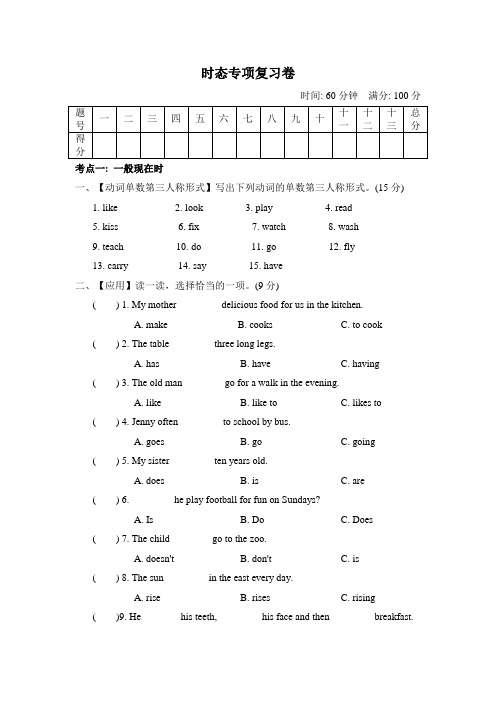
时态专项复习卷时间: 60分钟满分: 100分考点一: 一般现在时一、【动词单数第三人称形式】写出下列动词的单数第三人称形式。
(15分)1. like___________2. look________3. play__________4. read__________5. kiss__________6. fix__________7. watch________8. wash__________9. teach__________ 10. do________ 11. go__________ 12. fly____________13. carry________ 14. say________ 15. have________二、【应用】读一读,选择恰当的一项。
(9分)() 1. My mother ________ delicious food for us in the kitchen.A. makeB. cooksC. to cook() 2. The table ________ three long legs.A. hasB. haveC. having() 3. The old man________ go for a walk in the evening.A. likeB. like toC. likes to() 4. Jenny often ________ to school by bus.A. goesB. goC. going() 5. My sister ________ ten years old.A. doesB. isC. are() 6. ________ he play football for fun on Sundays?A. IsB. DoC. Does() 7. The child________ go to the zoo.A. doesn'tB. don'tC. is() 8. The sun ________ in the east every day.A. riseB. risesC. rising()9. He________his teeth, ________ his face and then ________ breakfast.A. brush; wash; haveB. brushes; washes; haveC. brushes; washes; has三、【句型练习】按要求完成下列句子。
(完整版)一般现在时练习题及答案解析

一、一般现在时填空题1.Miss Green _________ (teach) us English every day.【答案】teaches【解析】【详解】句意:格林小姐每天教我们英语。
teach教,动词;由句中的every day可知句子时态用一般现在时,主语Miss Green是第三人称单数形式,所以谓语动词teach也要用第三人称单数形式teaches。
故填teaches。
2.Sam often ________ (fly) kites with his friends on windy days.【答案】flies【解析】【详解】句意:萨姆经常在刮风的日子和他的朋友放风筝。
根据“often”可知,该句为一般现在时,主语“Sam”是第三人称单数,谓语用动词的三单形式,“fly”的三单形式是“flies”。
故填flies。
3.I think the boy ________ (look) like his father.【答案】looks【解析】【详解】句意:我觉得这个男孩看起来像他的父亲。
根据语境可知,该句为一般现在时,主语“the boy”是第三人称单数,谓语用动词的第三人称单数形式,“look”的第三人称单数形式是“looks”。
故填looks。
4.Linda __________ (exercise) every morning, so she is very healthy.【答案】exercises【解析】【详解】句意:琳达每天早上锻炼,所以她很健康。
根据时间状语“every morning”可知,句子是一般现在时,主语是第三人称单数形式,故动词应用单三式exercises。
故填exercises。
5.His brother _____________ (work) at a hospital.【答案】works【解析】【详解】句意:他哥哥在一家医院工作。
根据时态是一般现在时,主语“His brother”是第三人称单数,所以用动词work“工作”的第三人称单数works,故填works。
人教版六年级英语下册时态专项练习卷(含答案)
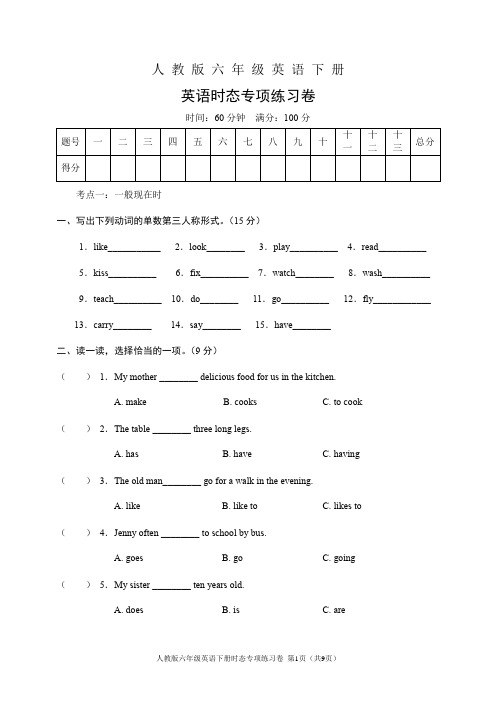
人教版六年级英语下册英语时态专项练习卷时间:60分钟满分:100分考点一:一般现在时一、写出下列动词的单数第三人称形式。
(15分)1.like___________ 2.look________ 3.play__________ 4.read__________ 5.kiss__________ 6.fix__________ 7.watch________ 8.wash__________ 9.teach__________ 10.do________ 11.go__________ 12.fly____________ 13.carry________ 14.say________ 15.have________二、读一读,选择恰当的一项。
(9分)()1.My mother ________ delicious food for us in the kitchen.A. makeB. cooksC. to cook()2.The table ________ three long legs.A. hasB. haveC. having()3.The old man________ go for a walk in the evening.A. likeB. like toC. likes to()4.Jenny often ________ to school by bus.A. goesB. goC. going()5.My sister ________ ten years old.A. doesB. isC. are()6.________ he play football for fun on Sundays?A. IsB. DoC. Does()7.The child________ go to the zoo.A. doesn'tB. don'tC. is()8.The sun ________ in the east every day.A. riseB. risesC. rising()9.He________his teeth, ________ his face and then ________ breakfast.A. brush; wash; haveB. brushes; washes; haveC. brushes; washes; has三、按要求完成下列句子。
(完整版)一般现在时练习题及答案解析

一、一般现在时填空题1.Tim usually ________(get)up at six o’clock.【答案】gets【解析】【详解】句意:Tim通常六点钟起床。
根据usually可知时态是一般现在时,主语Tim是第三人称单数,所以谓语动词get也用第三人称单数gets,故填gets。
2.Liu Xiang ________ (come) from China.【答案】comes【解析】【详解】句意:刘翔来自中国。
本句时态是一般现在时,主语是第三人称单数,动词用三单。
故填comes。
3.The police ________ (follow) the man in red along the lake.【答案】follow##followed【解析】【详解】句意:警察沿着湖跟踪那个穿红衣服的人。
follow“跟随”,动词;根据“The police… the man in red along the lake.”可知,此处可以是陈述一个事实,也可以指过去发生的事情;因此,时态可用一般现在时或一般过去时;主语“the police”是集合名词,谓语动词用复数。
故填follow/followed。
4.The pair of shoes ________ (fit) you very well.【答案】fits【解析】【详解】句意:这双鞋很适合你。
fit“适合”,是动词。
the pair of作主语时,谓语动词用第三人称单数形式,故填fits。
5.My mother often ________ (take) a subway to work.【答案】takes【解析】【详解】句意:我妈妈经常乘地铁去上班。
根据“often”可知此句时态为一般现在时,主语“My mother”是第三人称单数,谓语动词应使用三单形式,take的三单形式是takes,故填takes。
6.Mike often ________ (play) the violin in the evening.【答案】plays【解析】【详解】句意:Mike经常在晚上拉小提琴。
六年级英语一般现在时单选题50题
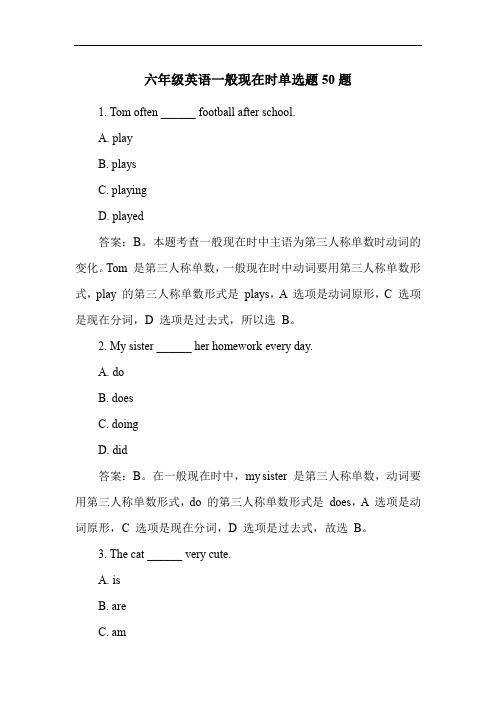
六年级英语一般现在时单选题50题1. Tom often ______ football after school.A. playB. playsC. playingD. played答案:B。
本题考查一般现在时中主语为第三人称单数时动词的变化。
Tom 是第三人称单数,一般现在时中动词要用第三人称单数形式,play 的第三人称单数形式是plays,A 选项是动词原形,C 选项是现在分词,D 选项是过去式,所以选B。
2. My sister ______ her homework every day.A. doB. doesC. doingD. did答案:B。
在一般现在时中,my sister 是第三人称单数,动词要用第三人称单数形式,do 的第三人称单数形式是does,A 选项是动词原形,C 选项是现在分词,D 选项是过去式,故选B。
3. The cat ______ very cute.A. isB. areC. am答案:A。
主语the cat 是第三人称单数,be 动词要用is,B 选项are 用于复数主语,C 选项am 用于I 后面,D 选项be 是动词原形,所以答案是A。
4. He ______ to school by bike.A. goB. goesC. goingD. went答案:B。
he 是第三人称单数,一般现在时中动词要用第三人称单数形式,go 的第三人称单数形式是goes,A 选项是动词原形,C 选项是现在分词,D 选项是过去式,因此选B。
5. My father ______ TV in the evening.A. watchB. watchesC. watchingD. watched答案:B。
my father 是第三人称单数,一般现在时中watch 要用第三人称单数形式watches,A 选项是动词原形,C 选项是现在分词,D 选项是过去式,所以选B。
6. She ______ go to school on Sundays.A. doesn'tC. isn'tD. aren't答案:A。
小升初语法辨析一般现在时一般过去时一般将来时(讲义)人教PEP版英语六年级下册

小升初英语语法辨析:一般现在时、一般过去时、一般将来时&专项模拟练习一、一般现在时1.定义:表示经常发生的动作、存在的状态或普遍真理。
2.时间标志词:often(经常)、usually(通常)、always(总是)、sometimes(有时)、every day/week/month/year(每天/ 周/ 月/ 年)等。
3.结构:1.主语(非第三人称单数)+ 动词原形。
例如:You play basketball afterschool.(你放学后打篮球。
)2.主语(第三人称单数)+ 动词的第三人称单数形式。
例如:He playsbasketball after school.(他放学后打篮球。
)4.用法:1.表示经常性或习惯性的动作。
如:I go to school by bike every day.(我每天骑自行车去上学。
)2.表示现在的状态或特征。
如:She is tall and thin.(她又高又瘦。
)3.表示客观事实或普遍真理。
如:The earth moves around the sun.(地球绕着太阳转。
)二、一般过去时1.定义:表示过去某个时间发生的动作或存在的状态。
2.时间标志词:yesterday(昨天)、last week/month/year(上周/ 上个月/ 去年)、ago(……以前)、in + 过去的年份等。
3.结构:主语+ 动词的过去式。
例如:You played basketball yesterday.(你昨天打了篮球。
)4.用法:1.表示过去某个时间发生的动作。
如:I went to the park last Sunday.(我上周日去了公园。
)2.表示过去存在的状态。
如:He was happy yesterday.(他昨天很开心。
)三、一般将来时1.定义:表示将来某个时间要发生的动作或存在的状态。
2.时间标志词:tomorrow(明天)、next week/month/year(下周/ 下个月/ 明年)、in the future(在未来)等。
人教版小学六年级英语时态练习题
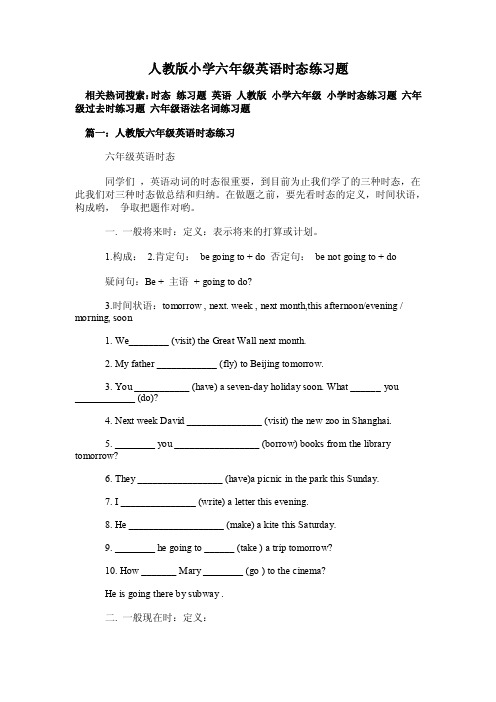
人教版小学六年级英语时态练习题相关热词搜索:时态练习题英语人教版小学六年级小学时态练习题六年级过去时练习题六年级语法名词练习题篇一:人教版六年级英语时态练习六年级英语时态同学们,英语动词的时态很重要,到目前为止我们学了的三种时态,在此我们对三种时态做总结和归纳。
在做题之前,要先看时态的定义,时间状语,构成哟,争取把题作对哟。
一. 一般将来时:定义:表示将来的打算或计划。
1.构成:2.肯定句:be going to + do 否定句:be not going to + do疑问句:Be + 主语+ going to do?3.时间状语:tomorrow , next. week , next month,this afternoon/evening / morning, soon1. We________ (visit) the Great Wall next month.2. My father ____________ (fly) to Beijing tomorrow.3. You ___________ (have) a seven-day holiday soon. What ______ you____________ (do)?4. Next week David _______________ (visit) the new zoo in Shanghai.5. ________ you _________________ (borrow) books from the library tomorrow?6. They _________________ (have)a picnic in the park this Sunday.7. I _______________ (write) a letter this evening.8. He ___________________ (make) a kite this Saturday.9. ________ he going to ______ (take ) a trip tomorrow?10. How _______ Mary ________ (go ) to the cinema?He is going there by subway .二. 一般现在时:定义:1. 经常性或习惯性的动作。
六年级下册英语试题-一般现在时 人教pep含答案
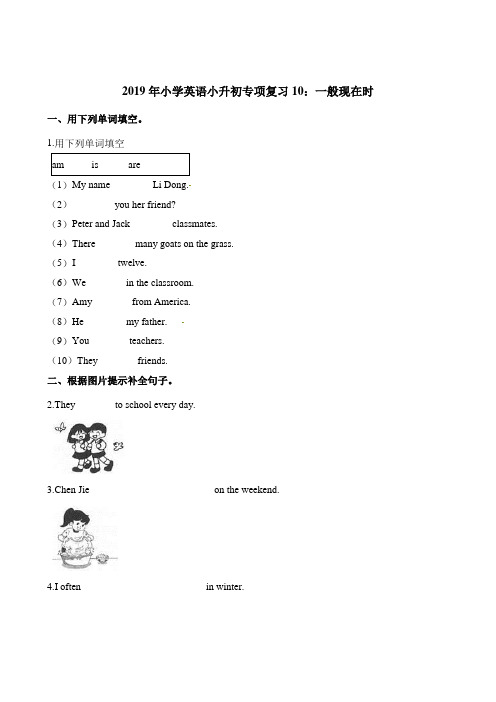
2019年小学英语小升初专项复习10:一般现在时一、用下列单词填空。
1.用下列单词填空(1)My name________ Li Dong.(2)________ you her friend?(3)Peter and Jack ________classmates.(4)There________many goats on the grass.(5)I ________twelve.(6)We________in the classroom.(7)Amy________from America.(8)He ________my father.(9)You________teachers.(10)They________friends.二、根据图片提示补全句子。
2.They________to school every day.3.Chen Jie________ ________ ________on the weekend.4.I often________ ________ ________in winter.5.My father usually________ ________after dinner.6.We________ ________on March 12th every year.三、用所给单词的适当形式填空。
7.Xiao Fang________(wear)a skirt today.8.My little brother________(watch)TV every day.9.I often________(play)the piano.10.The sun________(shine)and the weather________(get)warmer and warmer.11.He________(look)so sad today. What's the matter with him?12.My uncle________(work)in a factory. He is a worker.13.Who________(have)an eraser?14.How________(do)Mike feel?15.Do you________(live)in Haikou?四、选择正确的答案,将其序号填入题前括号里。
(完整word版)一般现在时态练习题,六年级下册,快乐英语,
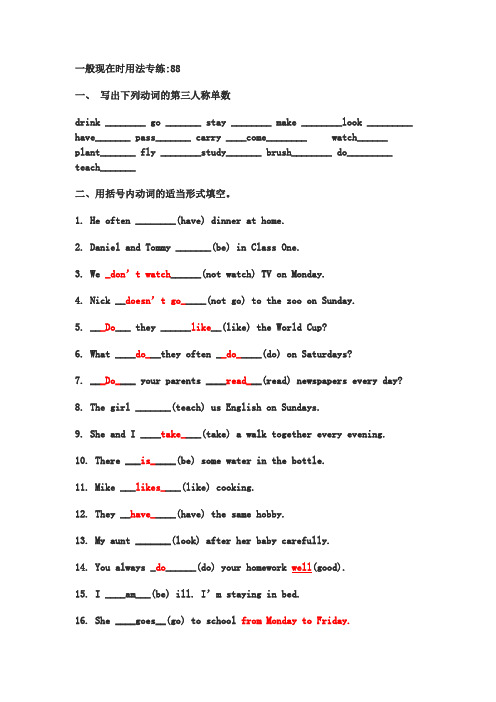
一般现在时用法专练:88一、写出下列动词的第三人称单数drink ________ go _______ stay ________ make ________look _________ have_______ pass_______ carry ____come________ watch______ plant_______ fly ________study_______ brush________ do_________ teach_______二、用括号内动词的适当形式填空。
1. He often ________(have) dinner at home.2. Daniel and Tommy _______(be) in Class One.3. We _don’t watch______(not watch) TV on Monday.4. Nick __doesn’t go_____(not go) to the zoo on Sunday.5. ___Do___ they ______like__(like) the World Cup?6. What ____do___they often __do_____(do) on Saturdays?7. ___Do____ your parents ____read___(read) newspapers every day?8. The girl _______(teach) us English on Sundays.9. She and I ____take____(take) a walk together every evening.10. There ___is_____(be) some water in the bottle.11. Mike ___likes____(like) cooking.12. They __have_____(have) the same hobby.13. My aunt _______(look) after her baby carefully.14. You always _do______(do) your homework well(good).15. I ____am___(be) ill. I’m staying in bed.16. She ____goes__(go) to school from Monday to Friday.17. Liu Tao ___does____(do) not like PE.18. The child often _______(watch) TV in the evening.19. Su Hai and Su Yang ____have__(have) eight lessons this term.20. -What day _______(be) it today?- It’s Saturday.三、按照要求改写句子1. Daniel watches TV every evening.(改为否定句)_____________________________2. I do my homework every day.(改为一般疑问句,作否定回答)_______________________3. She likes milk.(改为一般疑问句,作肯定回答)_________________________4. Amy likes playing computer games.(改为一般疑问句,作否定回答)________________5. We go to school every morning.(改为否定句)______________6. He speaks English very well.(改为否定句)_____________________7. I like taking photos in the park.(对划线部分提问)_______________________________8. John comes from Canada.(对划线部分提问)_____________________________9. She is always a good student.(改为一般疑问句,作否定回答)____________________10. Simon and Daniel like going skating.(改为否定句)___________________________五、改错(划出错误的地方,将正确的写在横线上)1. Is your brother speak English? __________________2. Does he likes goingfishing? __________________3. He likes play games after class. __________________4. Mr. Wu teachs usEnglish. __________________5. She don’t do her homework on Sundays. _________________现在进行时专项练习:一、写出下列动词的现在分词:play________ run__________ swim _________make__________ go_________ like________ write________ _ski___________read________have_________ sing ________ dance_________put_________ see________ buy _________ love____________live_______ take_________ come________ get_________stop_________ sit ________ begin________ shop___________二、用所给的动词的正确形式填空:1.The boy __________________ ( draw)a picture now.2. Listen .Some girls _______________ ( sing)in the classroom .3. My mother _________________ ( cook )some nice food now.4. What _____ you ______ ( do ) now?5. Look . They _______________( have) an English lesson .6.They ____________(not ,water) the flowers now.7.Look! the girls ________________(dance )in the classroom .8.What is our granddaughter doing? She _________(listen ) to music.9. It’s 5 o’clock now. We _____________(have)supper now10.______Helen____________(wash )clothes? Yes ,she is .三、句型转换:1. They are doing housework .(分别改成一般疑问句和否定句)2.The students are cleaning the classroom . ( 改一般疑问句并作肯定和否定回答)3.I’m playing the football in the playground .(对划线部分进行提问)4.Tom is reading books in his study . (对划线部分进行提问)五、将来时理论及练习1. 我打算明天和朋友去野炊。
六年级英语时态动词练习题
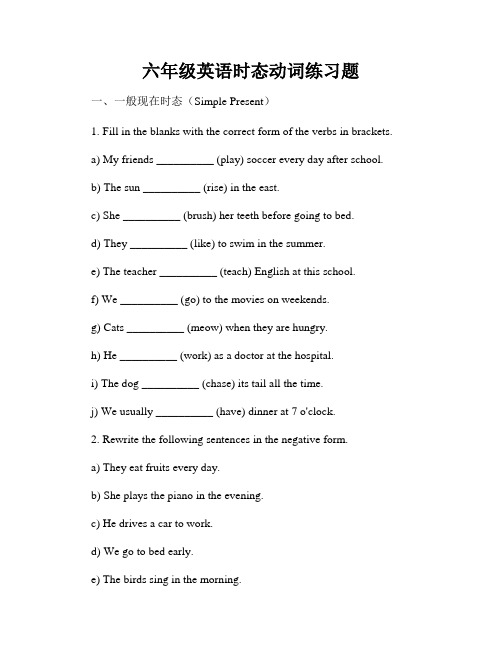
六年级英语时态动词练习题一、一般现在时态(Simple Present)1. Fill in the blanks with the correct form of the verbs in brackets.a) My friends __________ (play) soccer every day after school.b) The sun __________ (rise) in the east.c) She __________ (brush) her teeth before going to bed.d) They __________ (like) to swim in the summer.e) The teacher __________ (teach) English at this school.f) We __________ (go) to the movies on weekends.g) Cats __________ (meow) when they are hungry.h) He __________ (work) as a doctor at the hospital.i) The dog __________ (chase) its tail all the time.j) We usually __________ (have) dinner at 7 o'clock.2. Rewrite the following sentences in the negative form.a) They eat fruits every day.b) She plays the piano in the evening.c) He drives a car to work.d) We go to bed early.e) The birds sing in the morning.f) I drink coffee in the morning.g) She watches TV in the living room.h) They study in the library.i) We visit our grandparents on Sundays.j) He reads books in his free time.3. Complete the sentences with the correct question word.a) __________ do you go to the park? - On Saturdays.b) __________ does she play volleyball? - At the gym.c) __________ does he usually wake up? - At 7 o'clock in the morning.d) __________ do they study for the test? - In the library.e) __________ does your father work? - At a bank.f) __________ do you like to do in your free time? - Watch movies.g) __________ does the bus arrive? - At 9 a.m.h) __________ does the train leave? - From platform 3.i) __________ does she go shopping? - On Sundays.j) __________ does he travel? - By car.二、一般过去时态(Simple Past)1. Fill in the blanks with the correct form of the verbs in brackets.a) My family __________ (visit) London last year.b) They __________ (play) soccer yesterday afternoon.c) She __________ (read) a book before going to bed.d) We __________ (go) to the museum on Saturday.e) He __________ (watch) a movie at the cinema.f) The dog __________ (bark) loudly during the thunderstorm.g) I __________ (eat) pizza for dinner last night.h) They __________ (have) a party on the weekend.i) She __________ (draw) a beautiful picture.j) We __________ (visit) our grandparents last Sunday.2. Rewrite the following sentences in the negative form.a) He studied math for two hours yesterday.b) They watched a movie in the evening.c) She visited her friend last week.d) We played basketball at the park.e) The birds sang in the afternoon.f) I ate lunch at the restaurant.g) She met her friends at the café.h) They completed their homework.i) We went to the beach on Sunday.j) He read a book before bed.3. Complete the sentences with the correct question word.a) __________ did you go on vacation? - To the beach.b) __________ did they see at the concert? - A famous singer.c) __________ did he buy for his sister's birthday? - A necklace.d) __________ did she cook for dinner? - Spaghetti.e) __________ did your parents meet? - In college.f) __________ did you celebrate your birthday? - With a party.g) __________ did the plane land? - At the airport.h) __________ did the class start? - At 9 a.m.i) __________ did she travel to last summer? - France.j) __________ did he play with at the park? - His friends.三、一般将来时态(Simple Future)1. Fill in the blanks with the correct form of the verbs in brackets.a) Tomorrow, I __________ (visit) my grandparents.b) They __________ (have) a party next weekend.c) She __________ (buy) a new dress for the event.d) We __________ (travel) to Paris next summer.e) He __________ (give) a presentation at work tomorrow.f) The school __________ (organize) a field trip next month.g) I __________ (meet) my friends for lunch later today.h) They __________ (watch) a movie at the cinema tonight.i) She __________ (start) a new job next Monday.j) We __________ (move) to a new house next year.2. Rewrite the following sentences in the negative form.a) I will study English tonight.b) They will go shopping tomorrow.c) She will visit her grandparents next week.d) We will have a picnic on Saturday.e) The birds will sing in the morning.f) He will eat dinner at home.g) She will watch a movie at the theater.h) They will complete their homework before dinner.i) We will go hiking this weekend.j) He will read a book before bed.3. Complete the sentences with the correct question word.a) __________ will you do on your birthday? - Have a party.b) __________ will they meet at the park? - At 2 p.m.c) __________ will he travel to next summer? - Japan.d) __________ will she cook for dinner? - Pasta.e) __________ will your family celebrate Christmas? - With a big dinner.f) __________ will you arrive at the airport? - At 6 p.m.g) __________ will the concert start? - At 7 o'clock.h) __________ will the summer break begin? - In June.i) __________ will she go for vacation? - To the beach.j) __________ will he meet for coffee? - His colleagues.。
人教版PEP六年级英语下册期末时态专项 一般现在时

人教版PEP六年级英语下册时态一:一般现在时一单项选择。
(10分)( )1.Wang Bing at home every day.He always his things in order.A.do well;putB.did well;putsC.does well;puts( )2.—What they often on Sundays?—They often play football on Sundays.A.does;doB.do;doesC.do;do( )3.—Jim like basketball?—Yes.He likes it very much.A.Does;playingB.Is;playsC.Did;play( )4.Jill and her friend often hiking on the weekend.A.wentB.goC.goes二用所给单词的适当形式填空。
(15分)1.She usually (study) English on Sundays.2.Sam often (clean) his bedroom on the weekend.3.Each girl (have) a dream.4.Jim always (do) his homework in the evening.5.How many lessons (do)Tim have on Mondays?三连词成句。
(注意大小写)(15分)1.reading,Peter,stories,likes(.)____________________________________________________________________ 2.John's,teaches,in,school,a,English,mother(.)____________________________________________________________________ 3.he,older,me,than,is,smarter,and(.)____________________________________________________________________ 4.buy,I,to,magazine,want,the,film,new(.)____________________________________________________________________ 5.mine,bigger,your,than,feet,are(.)____________________________________________________________________ 四按要求完成下列各题。
六年级英语时态专项练习题

小学六年级英语时态练习题(一般现在时、现在进行时、一般将来时、一般过去时)I 用适当形式填空•1. He _________ back a month ago. (come)2. My mother ofte n tells me ________ in bed. (not read)3. I must take it back the day after tomorrow. You can only _________ it for 24 hours. (keep)4. Why did you keep me _________ here for so long a time? (wait)5. Please come to our meeting if you ____________ free tomorrow. (be)6. In his letter, he said that he _________ us very much. (miss)7. He said he became _________ i n physics. (in terest)12. In the old days it was difficult for the poor to ________ a job. ( find)13. It's cold outside, so you'd better _______ your coat. (put on)14. He is hun gry. Please give him someth ing ________ . (eat)17. You have dropped your pencil. ________ .( 拾起它)18. Mother ofte n tells me ________ too late. (not come home)19. You had better __________ by bus, or you will be late. (go)20. I will _________ Li Ming the good n ews as soon as I see him.( tell)23. It _________ me two days to write the article. (take)24. Don't touch that _________ child. (sleep)30. Yesterday Mary could n't finish her homework, so she has to go on _________it this after noon. (do)38. Would you please _________ m e an En glish-Ch in ese dicti onary whe n you come? (bri ng)43. There __________ a physics test next Mon day. (be)44. ________ I finish my homework in class?( 必须)No, you n eed n't.45. I'm sorry you've missed the last bus. It _________ ten minu tes ago. (leave)51. I regretted an sweri ng like that, I was sorry _________ so. (do)53. He ________ worried whe n coming into the teacher's office. (look)54. ________ come beef!( 随便吃点)56. Look!That man __________ (open)the door of your car.57. The moon _____ nd the earth.58.I must go no w. It —________ te.59. Let's go out. It — __________ now.60. Julia is good at Ian guages. She (speak)four languages very well.61. Hurry up! Everybody —______ (wait)for you.62. "______ isten)to the radio? ” "No, you can turn it off. ”63. "______ isten)to the radio? ” "No, just occasionally.64. We usually ________ egetables in our garden but this year we(not/grow)a ny.65. R on is in London at the mome nt .He_____________ (stay)at the Park Hotel.He always (stay)there whe n he's in London.66. Ca n we stop walk ing soon? I_________ ired.71."What____ your father do(do)? ” "He's an engineer but I_________ nj oy)this one very much.n.选择题.72 According to the time table, the train for London ___ at seven o'clock in th e evening.A. was leavingB. has leftC. leavesD. will leave73 You should visit this part of the country when ___A. spring will comB. spring comesC. It has been springD. It will be spring76. Obviously, he ___ a bad cold. He sneezes so often.A. hasB. has beenC. hadD. wasA. winsB. was winningC. had wonD. has won90. —Who sings best in your class?—Mary ____ .A. isB. doesC. doD. sing91. She ____ her pen in her room now.A. findsB. is findingC. looks forD. is looking for93. What ____ you ____ tomorrow morning?A. are/going to doB. are/doingC. are/doneD. have/done96. He found his book this morning, but now he ____ his pen.A. losesB. is missingC. has lostD. lost98. It ___ Jane and Mary who helped me the other day.A. isB. wasC. areD. were一、用动词的正确形式填空1. I _______ (do) my homework every evening.2. We _____ (fly) kites in the park on Sundays.3. My mother ______ (clean) our room on Sundays.4. Tom ____ (play) the piano every Saturday. Now he _______ (play).5. She _____ (like) swimming. She _____ (swim) this weekend.6. Usually my mother ______ (wash) the dishes after lunch. But my grandma ______ (wash) today.7. Look at the man! He _____ (read) a magazine.8. Look! The plane ________ (fly) over the building.9. Listen! My aunt ______ (sing) in the room. She is a singer. She _____ (like) singing. She _____ (have) a music show. She is excited.10. Tom and Mike always ____ (swim) in the river. They ____ (swim) in the sw imming pool this Sunday. Look! They _____ (swim).11. What ______ you usually ____ (do) in the evening?I _____ (play) computer games.12. What ______ you _____ (do) now?I _____ (make) a paper plane.13. What ______ he ______ (do)?He _____ (dance).14. What ______ she _____ (do) yesterday?She _____ (visit) her grandparents.15. ____ your mother ____ (read) newspaper in the morning?Yes, She _______ .16. _____ you ______ (like) fishing?No, I ____ . I like ______ (swim),but my brother _____ (like).17. How ____ your father ______ (go) to work every day?He _____ (go) by bike. But it 's cold today. He _____ (take) the No.21 bus, and he ______ (go) to work by taxi yesterday.18. _____ the monkey ______ (like) climbing trees? Yes, it ______ .19. What _____ your father ____ (do) after lunch? He ______ (read) a comic book. What ____ he ______ (do) today? He _____ (clean) the kitchen for my g randma. Look! He (clean).20. ______ you _____ (collect) stamps? Yes. I ______ .________ your brother ____ (collect), too? No, he _______ .二、选择题1. ___ he ____ to the park at 6:30 in the morning? No,he _____ .A. Does; goes; doesB. Does; go; doesn 'tC. Does; go; does2. What colour ___ you ___ this bookcase? I ____ it pink.A. are; going to paint; am going to paintB. do; paint; paintC. did; paint; painted3. Tim always ____ a picture at home. He ____ a car now.A. draws; is drawingB. draw; drawC. draws; draw4. She usually ___ her friends. They often ____ tea.A. see; drinkB. sees; drinksC. sees; drink5. He usually ____ the dishes at night, but tonight he ___ clothes.A. wash; washB. washes; is going to washC. is washing; washes6. Mr. Green usually __ his newspaper in the evening, but he and his wife _____ television yesterday evening.A. reads; watchesB. reads; is going to watchC. reads; watched7. Where are the man and the woman? They ___ near the tree.A. sitB. satC. are sitting8. ___ your pen friend ____ diving? No, he ____ .He ______ writing stories.A. Does; like; doesn 't; likesB. Does; likes; doesn 't; likeC. Do; like; don 't; likes9. ___ you _____ fishing yesterday? No, we __ .A. Does; go; doesn 'tB. Did; go; didn 'tC. Do; go; don 't10. Open the window, Please. Look! He ___ it.A. opensB. is openningC. is opening11. I usually ___ some milk every day. But I ___ coffee yesterday.A. drink; drankB. is drinking; drinkC. drank; am drinking12. Mr. Green often ___ his newspapers at night. But he ___ an interestingbook tonight.A. reads; readsB. reads; readC. reads; is going to read13. The old man ____ playing sports in the park. He ____ morning exercise now.A. likes; is doingB. likes; doesC. like; doing14. What __ you usually _____ in the evening? I _____ computer games.What ____ you ___ last night? I ______ a book.A. do; do; playB. did; do; playedC. does; do; playsdid; do; read do; do; read do; do; am reading16. ___ you ___ to music now? Yes, we _____ .A. Do; listen; doB. Did; listen; didC. Are; listening; are17. Put on you coat, please. OK. I _____ it on.A. am puttingB. am going to putC. put18. ___ you ______ coffee? Yes, I ____ .A. Do; like; doB. Did; like; didC. Are; like; am20. She ____ tea, but he ___ .A. likes; doesn 't B; like; don 't C. like; doesn 't。
(完整版)一般现在时练习题及答案
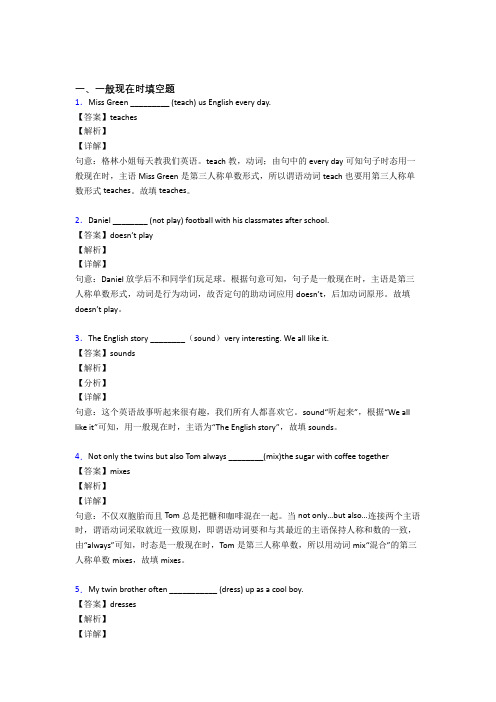
一、一般现在时填空题1.Miss Green _________ (teach) us English every day.【答案】teaches【解析】【详解】句意:格林小姐每天教我们英语。
teach教,动词;由句中的every day可知句子时态用一般现在时,主语Miss Green是第三人称单数形式,所以谓语动词teach也要用第三人称单数形式teaches。
故填teaches。
2.Daniel ________ (not play) football with his classmates after school.【答案】doesn’t play【解析】【详解】句意:Daniel 放学后不和同学们玩足球。
根据句意可知,句子是一般现在时,主语是第三人称单数形式,动词是行为动词,故否定句的助动词应用doesn’t,后加动词原形。
故填doesn’t play。
3.The English story ________(sound)very interesting. We all like it.【答案】sounds【解析】【分析】【详解】句意:这个英语故事听起来很有趣,我们所有人都喜欢它。
sound“听起来”,根据“We all like it”可知,用一般现在时,主语为“The English story”,故填sounds。
4.Not only the twins but also Tom always ________(mix)the sugar with coffee together【答案】mixes【解析】【详解】句意:不仅双胞胎而且Tom总是把糖和咖啡混在一起。
当not only…but also…连接两个主语时,谓语动词采取就近一致原则,即谓语动词要和与其最近的主语保持人称和数的一致,由“always”可知,时态是一般现在时,Tom是第三人称单数,所以用动词mix“混合”的第三人称单数mixes,故填mixes。
人教版六年级英语下册一般现在时态练习题1
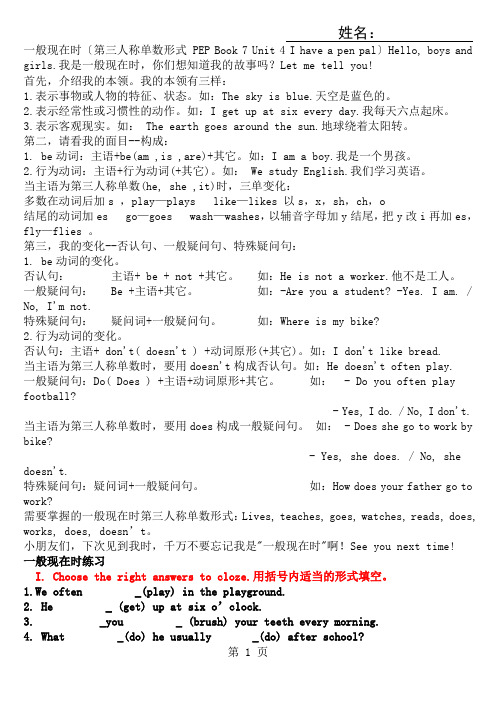
姓名:一般现在时〔第三人称单数形式 PEP Book 7 Unit 4 I have a pen pal〕Hello, boys and girls.我是一般现在时,你们想知道我的故事吗?Let me tell you!首先,介绍我的本领。
我的本领有三样:1.表示事物或人物的特征、状态。
如:The sky is blue.天空是蓝色的。
2.表示经常性或习惯性的动作。
如:I get up at six every day.我每天六点起床。
3.表示客观现实。
如: The earth goes around the sun.地球绕着太阳转。
第二,请看我的面目--构成:1. be动词:主语+be(am ,is ,are)+其它。
如:I am a boy.我是一个男孩。
2.行为动词:主语+行为动词(+其它)。
如: We study English.我们学习英语。
当主语为第三人称单数(he, she ,it)时,三单变化:多数在动词后加s ,play—plays like—likes 以s,x,sh,ch,o结尾的动词加es go—goes wash—washes,以辅音字母加y结尾,把y改i再加es,fly—flies 。
第三,我的变化--否认句、一般疑问句、特殊疑问句:1. be动词的变化。
否认句:主语+ be + not +其它。
如:He is not a worker.他不是工人。
一般疑问句: Be +主语+其它。
如:-Are you a student? -Yes. I am. / No, I'm not.特殊疑问句:疑问词+一般疑问句。
如:Where is my bike?2.行为动词的变化。
否认句:主语+ don't( doesn't ) +动词原形(+其它)。
如:I don't like bread.当主语为第三人称单数时,要用doesn't构成否认句。
小学英语一般现在时态练习题(通用)

小学英语一般现在时态练习题(通用)一般现在时态练卷一般现在时:表示经常性的事情时间状语:often经常,usually通常,always总是,every 每个,sometimes有时,at…在几点钟只有在第三人称单数用动词的“三单变化”,其他用动词的原形。
三单变化:1.多数在动词后+s play—plays like—likes2.以s ,x ,sh ,ch , o结尾的+es,go—goes wash—washes3.以辅音字母加y结尾,把y改成i再加esfly—flies cry—cries一.用动词的适当形式填空1. She _________(go) to school at seveno’clock.2. It’s6o’clock. They are _________(eat) supper.3. He usually ___________ up at 17:00.(get )4. She ___________ (live) in Beijing.5. Amy _________ (be) here just now.6. _______ (be)there a flyon the table just now?7. My father __________ (watch) TV XXX _______________ (make) toys these days.9.________ Amy _________ (read) English every day10. Chen Jie sometimes _________(go)to the park with her sister.二.选择填空1.I want____homework now.A. doingB. to doC. to do myD. do my2.It's time______.A.XXX3.____ you____the blackboard?Yes,I am.A.Can, XXX, XXX, XXX.______go and help her.A. Let's meB. Let's usC. Let'sD. Let's to5.What are they doing? They are______XXX6.Do they have a new car? Yes,_____.A .XXX'tD. they do7.He often _________ supper at 6:00 XXX. It’s 6 o’clock in the morning. He ___________.A. get upB. gets upC. is geting upD. is getting up9. What are you doing? I’m __________ TV.A. watchB. watchesC. to watchD. watching10. We _____________ any Chinese classes on XXX _______ an English class now.A. is havingB. hasC. havingD. have12. Are you playing basketball? No, we ___________.A. XXX’t13. Listen! The girl _____________ in the room.XXX singing14. The boy is __________ to his teacher.A. XXX3、用括号内动词的恰当方式填空。
小学英语一般现在时态练习
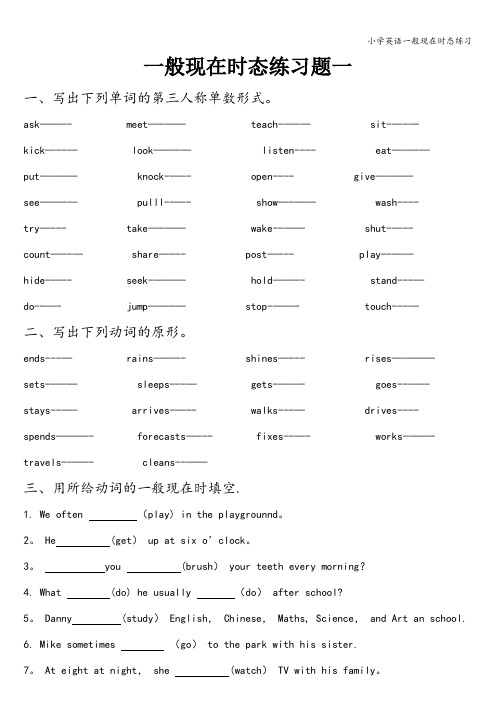
一般现在时态练习题一一、写出下列单词的第三人称单数形式。
ask——-- meet—-—— teach-—-— sit-—-—kick—--— look——-— listen---- eat——-—put-——— knock--—- open---- give———-see——-— pulll--—- show—-—— wash----try—--- take—-—— wake--—— shut-—--count—--— share—--- post—--- play--——hide-—-- seek-——— hold——-- stand---—do--—- jump——-— stop-——- touch---—二、写出下列动词的原形。
ends---— rains——-- shines—--- rises————sets-—-— sleeps---— gets-——- goes--——stays--—- arrives-—-- walks---— drives----spends———- forecasts—--- fixes--—- works-——-travels-——- cleans--——三、用所给动词的一般现在时填空.1. We often (play) in the playgrounnd。
2。
He (get) up at six o’clock。
3。
you (brush) your teeth every morning?4. What (do) he usually (do) after school?5。
Danny (study) English, Chinese, Maths, Science, and Art an school.6. Mike sometimes (go) to the park with his sister.7。
At eight at night, she (watch) TV with his family。
小学六年级英语时态练习题及答案

小学六年级英语时态练习题及答案一、时态概念回顾在学习英语时态之前,我们首先需要了解时态的概念。
时态指的是动词表示的动作或状态发生的时间。
英语中常用的时态有以下几种:一般现在时、一般过去时和一般将来时。
在学习英语时态时,我们需要掌握每种时态的基本用法和表示的时间。
二、一般现在时练习题1. 选择正确的动词形式填空。
1.He ______ (go/goes) to school every day.2.My sister ______ (likes/like) playing basketball.3.They ______ (watch/watches) TV in the evening.4.The train ______ (arrive/arrives) at 6 o’clock.5.I ______ (play/plays) the piano on weekends.2. 根据句子的意思,选择正确的答案。
1.______ your parents work in a factory? (Does/Do)2.We ______ basketball after school. (plays/play)3.Tom ______ a sandwich for lunch. (eat/eats)4.______ your brother like swimming? (Does/Do)5.My teacher ______ English very well. (teach/teaches)答案:1.goes2.likes3.watch4.arrives5.play6.Do7.play8.eats9.Does10.teaches三、一般过去时练习题1. 选择动词的适当形式填空。
1.He ______ (go/went) to the park yesterday.2.They ______ (watch/watched) a movie last night.3.She ______ (visit/visited) her grandparents on the weekend.4.We ______ (play/played) football yesterday.5.The cat ______ (catch/caught) a mouse just now.2. 根据句子的意思,选择正确的答案。
- 1、下载文档前请自行甄别文档内容的完整性,平台不提供额外的编辑、内容补充、找答案等附加服务。
- 2、"仅部分预览"的文档,不可在线预览部分如存在完整性等问题,可反馈申请退款(可完整预览的文档不适用该条件!)。
- 3、如文档侵犯您的权益,请联系客服反馈,我们会尽快为您处理(人工客服工作时间:9:00-18:30)。
姓名:一般现在时(第三人称单数形式PEP Book 7 Unit 4 I have a pen pal)Hello, boys and girls.我是一般现在时,你们想知道我的故事吗Let me tell you!首先,介绍我的本领。
我的本领有三样:1.表示事物或人物的特征、状态。
如:The sky is blue.天空是蓝色的。
2.表示经常性或习惯性的动作。
如:I get up at six every day.我每天六点起床。
3.表示客观现实。
如:The earth goes around the sun.地球绕着太阳转。
第二,请看我的面目--构成:1. be动词:主语+be(am ,is ,are)+其它。
如:I am a boy.我是一个男孩。
2.行为动词:主语+行为动词(+其它)。
如:We study English.我们学习英语。
当主语为第三人称单数(he, she ,it)时,三单变化:多数在动词后加s ,play—plays like—likes 以s,x,sh,ch,o结尾的动词加es go—goes wash—washes,以辅音字母加y结尾,把y改i再加es,fly—flies 。
第三,我的变化--否定句、一般疑问句、特殊疑问句:1. be动词的变化。
否定句:主语+ be + not +其它。
如:He is not a worker.他不是工人。
一般疑问句:Be +主语+其它。
如:-Are you a student -Yes. I am. / No, I'm not.特殊疑问句:疑问词+一般疑问句。
如:Where is my bike2.行为动词的变化。
否定句:主语+ don't( doesn't ) +动词原形(+其它)。
如:I don't like bread.当主语为第三人称单数时,要用doesn't构成否定句。
如:He doesn't often play.一般疑问句:Do( Does ) +主语+动词原形+其它。
如:- Do you often play football- Yes, I do. / No, I don't.当主语为第三人称单数时,要用does构成一般疑问句。
如:- Does she go to work by bike- Yes, she does. / No, she doesn't.特殊疑问句:疑问词+一般疑问句。
如:How does your father go to work需要掌握的一般现在时第三人称单数形式:Lives, teaches, goes, watches, reads, does, works, does, doesn’t。
小朋友们,下次见到我时,千万不要忘记我是"一般现在时"啊!See you next time!一般现在时练习I. Choose the right answers to cloze.用括号内适当的形式填空。
often _(play) in the playground.2. He _ (get) up at six o’clock.3. _you _ (brush) your teeth every morning.4. What _(do) he usually _(do) after school5. ______ they ________(like) the World Cup6. _Mike sometimes __________(go) to the park with his sister.7. At eight at night, she _ (watch) TV with his parents.8 _ Mike _ (read) English every day9. How many lessons _your classmate________(have) on Monday10. What time _his mother (do) the houseworkusually _____ (get)up at six in the morning.1⒉She______(have) blues eyes.1⒊We _______(go ) to school every day1⒋The boy _________(like) playing football.1⒌We_______(have)no classes on Sundays.1⒍She________(write) to her mother once a week.1⒎It _____(rain)quite often during the month of July every year.1⒏She often_________(watch)TV on Saturdays.1⒐Mike usually_________(ride) a bike with his friends in the park.20 Peter and Mary often_______(play) badminton together.mother______(have) a lot of cousins.people often _______ (listen) to the radio in the moring.(do)she _______(like) playing the violinYes,she______(do).(have)four brothers. She______(like) them very much.24. He often ________(have) dinner at home.25. We _______(not watch) TV on Monday.usually _______(play) the piano on Sundays.cat________(like) eating fish every much.28. Su Hai and Su Yang _______(have) eight lessons this term.29. She and I ________(take) a walk together every evening.II. Read and fill in the blanks.(选词填空)Watches read goes gets eats lives worksMy aunt is a nurse. She likes music very much. She ______ in a big hospital. Every day she ______ up at 6:30. She ______ breakfast at 7:00. After breakfast she ______ to work by bus. She usually goes home at 5:30. After dinner, she often ______ TV and ______ books. At 10:30, she goes to bed.III. Read the questions and circle the right answers.(读问题,圈出正确的答案)does your pen pal liveA. No, she live in the country.B. She live in the city.C. She lives in the city.does she go to workA. She go to work at 7.B. She goes to work at 7.C. Yes, she does.3. Does Peter go to school by subwayA. No, he does.B. No, he doesn’t.C. Yes, on foot.4. What does Miss Green doA. She teaches English.B. Yes, she’s a teacher.C. At school.she read newspapers at nightA. Yes, she do.B. Yes, she does.C. No, she does.’s your pen pal’s hobbyA. She like reading.B. She like read.C. She likes reading.将来时态练习Be going to(PEP Book 7 Unit 3 What are you going to do)的用法Hi,大家好!今天向你们介绍一位爱展望未来的小精灵begoingto。
他呀,出生在"一般将来时"家族里。
表示将来某个时间将要发生的动作或存在的状态。
看"begoingto"长得多魁梧呀,他由三个词组成。
这三个词分开来都有自己的意思。
但组合在一起,只表示"打算,将要"。
其中"be"妈妈会根据主语的人称变化派出孩子们"is, am ,are"来完成任务。
"to"是"不定式符号"。
它有一个脾气,跟在它后面的动词必须是动词原形。
首先,我向你们展示我的几种句型。
一、陈述句(肯定句)(2)在肯定句中,小精灵的模样是:主语+be(am/is/are)+goingto+动词原形+其它。
如:HeisgoingtobuyanewCDafterschool.他放学后要去买张新CD。
Theyaregoingtovisittheirteachertomorrow.他们明天要去看望他们的老师。
在否定句要在be的后面加not.不信你来瞧:1、Iamnotgoingtoplayfootballafterschool.我不打算踢足球。
SheisnotgoingtowatchTVthisafternoon.今天下午她不打算看电视。
Wearenotgoingtothecinemaatnight.我们今晚不看电影。
二、一般疑问句这时候,小精灵模样是:Be(amisare)+主语+goingto+动词原形+其它,如:1、Areyougoingtoreadbookstonight-Yes,,Iamnot.2、Ishegoingtobuyacomicbookthismorning-Yes,he,heisnot.三、特殊疑问句疑问词+be(amisare)+主语+goingto+动词原形+其它,如:Whatisshegoingtodothisevening Sheisgoingtovisithergrandparents. Whataretheygoingtodotomorrow Theyaregoingtoplayfootball.其次,和他出现的朋友还有以下特征:thismorning,thisafternoon,thisevening,atnight,tomorrow,thisweekend,nextweek,soon等表示将来时间的词语。
